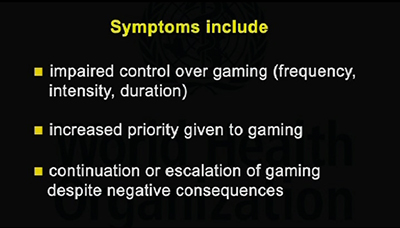 The World Health Organization (WHO) has classified Gaming addiction as a disorder in its 11th revision of the International Classification of Diseases (ICD-11). The 11th revision, which was released last year, listed the addiction as a mental health condition for the first time.
The World Health Organization (WHO) has classified Gaming addiction as a disorder in its 11th revision of the International Classification of Diseases (ICD-11). The 11th revision, which was released last year, listed the addiction as a mental health condition for the first time.
The International Classification of Diseases is the basis for the identification of health trends and statistics globally. ICD-11 will be presented at the World Health Assembly in May this year for adoption by member states and will come into effect from 2022.
In Bhutan, the popularity of the video games picked up over the years and with the advent of mobile phones, it has only added to the gaming culture in the country.
Lately, an online multiplayer battle game called Player Unknown’s Battlegrounds, popularly known as PUBG, has been picking up in the country. PUBG is one of the most popular online games in the world.
The online game has up to 100 players parachute onto an island and scavenge for weapons and equipment to kill others while avoiding getting killed themselves.
The available safe area of the game’s map decrease in size over time, directing surviving players into tighter areas to force encounters. The last player or team standing wins the round.
 One of the administrators of Bhutan PUBG page on Facebook, who organizes PUBG tournaments said, “PUBG has taken over other popular games within the country and it’s also one of the most downloaded games at the moment, so I would say it’s really addictive and has messed up our sleep patterns. Bhutan has only picked up about five months ago. One of the main reasons for its popularity is it doesn’t lag when we play, unlike other popular games that need a good internet connection.”
One of the administrators of Bhutan PUBG page on Facebook, who organizes PUBG tournaments said, “PUBG has taken over other popular games within the country and it’s also one of the most downloaded games at the moment, so I would say it’s really addictive and has messed up our sleep patterns. Bhutan has only picked up about five months ago. One of the main reasons for its popularity is it doesn’t lag when we play, unlike other popular games that need a good internet connection.”
Earlier this year, Gujarat, a state in India banned PUBG in few of its cities as the game was leading to violent behaviour among children and youth. It was adversely affecting the studies and overall behaviour, conduct and language of children.
While a lot of countries are already grappling with the issue of game addiction, Dr Chencho Dorji, a psychiatrist with the National Referral Hospital says he has received informal complaints from parents.
“For example, parents bring some of their children because they are not doing well in school or parents realize that their children are not socially interacting at homes or they are not going out by just locking themselves in the room or even when they are in the same room, they are all on this mobile. So from some of these issues that surface and then they come to us, the root cause of the problem is children are actually lured or attracted or addicted to this internet and gaming.”
Dr Chencho added that there are a lot of issues surfacing not just because of gaming but also because of the internet and social media in general.
“The more time they spend with this digital world, the less time they have for their normal world. So just interaction with your family, such as studying, children compromise their sleep, they stay awake for the whole night and play these games. And when they go to school, they won’t be able to attend classes or be attentive in the class or they miss out a lot of things like physical activities, which are important for growing up,” he said.
“Some children then also snack along when they are gaming, eating a lot of unhealthy stuff gaining weight.”
WHO describes gaming disorder as a pattern of persistent or recurrent behaviour, so severe that it takes over other life interests.
 The symptoms include impaired control over gaming, increased priority given to gaming and continuation or escalation of gaming despite negative consequences. And for it to be diagnosed, abnormal gaming behaviour should be evident for a period of over at least 12 months.
The symptoms include impaired control over gaming, increased priority given to gaming and continuation or escalation of gaming despite negative consequences. And for it to be diagnosed, abnormal gaming behaviour should be evident for a period of over at least 12 months.
As per WHO, a decision to include gaming disorder in ICD-11 is based on the review of available evidence and consensus of experts from different disciplines and geographical regions.
The inclusion of the disorder will follow the development of prevention and treatment programmes and measures.
“So once we have this nomenclature and it’s standardized then we can actually have more communication with professionals coming from all over the world. It is also good for patients to actually accept that they have a disorder and it’s easier for us to educate the public and the masses that this is a disease and that you should come for help,” Dr Chencho Dorji said.
Studies suggest that gaming disorder affects only a small proportion of people who engage in digital or video gaming activities. However, people who participate should be alert to the amount of time they spend on gaming activities.




